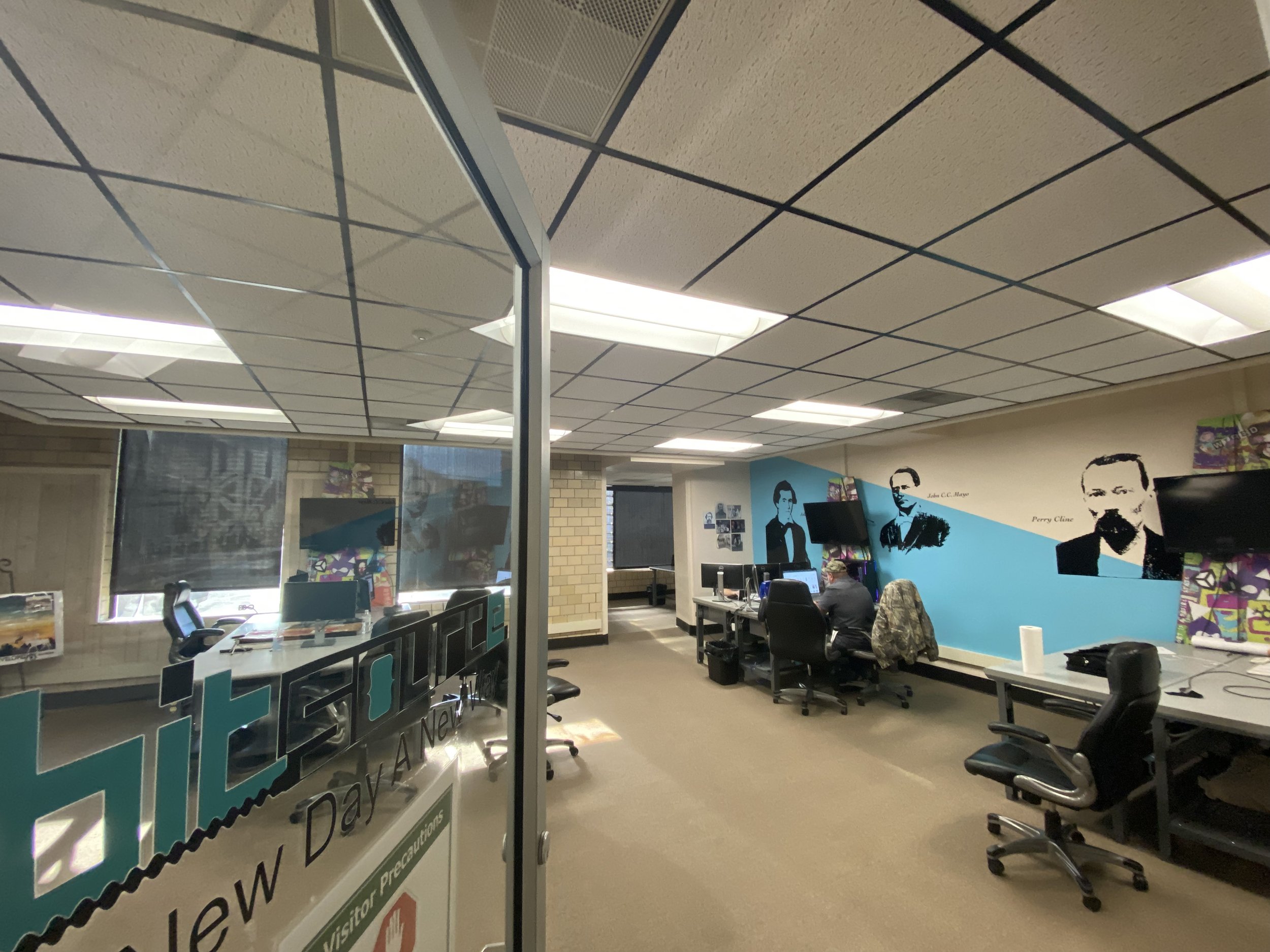Bit Source Rewrites the Code in Coal Country
The digital divide between rural and urban residents is beginning to close, according to a recent Pew Research Center report. While urban residents are still more likely to have broadband internet access or a computer at home than their rural counterparts, people living in rural areas have made significant gains in their access to technology over the last decade.
And as our culture and economy continue to become more connected digitally, thought leaders in Appalachia have identified an opportunity to help an economy reliant on coal transition into a more technologically resilient future. From this model, Rusty Justice and Lynn Parish started Bit Source in 2014, an organization responsible for upskilling and reskilling former coal miners to make custom software and applications for clients across the globe.
Illustration by August Northcut
Out of the Mine and into the Digital Economy
Payton May grew up less than 2 miles away from where Bit Source is now located in Pikeville. Even though he left home for his undergraduate and graduate degrees before embarking on an architectural sabbatical in Montana, May never lost his roots in the Pikeville area. After working with Rusty Justice on a couple independent projects, May was asked to contribute his creative talent to Justice and Lynn Parish’s new startup: Bit Source.
From the beginning, Justice and Parish had a tech-based vision for the Eastern Kentucky economy after coal. Excited by the opportunity to contribute, May agreed to help. “When they started renovating the building here,” May told us, “Rusty reached out to ask if I could help with the graphics and the interior. That turned into redesigning their logo and creating their website.”
Payton May, courtesy of The Daily Independent
Through his out-of-the-box and unconventional approach, May would become creative director for the company. After strategizing and executing creative design for Bit Source’s clients for his first three years at the company, he moved into the Chief Operations Officer in 2018. Since then, he has taken on the responsibility of ensuring his new employees are given the skills to produce top-notch software for Bit Source’s diverse clients.
Since its founding in 2014, the company’s mission has been to bring people from all over Appalachia to build a new technologically advanced work framework that shapes the region’s economy. “That was part of the ideology of Bit Source,” Garland Couch, lead mobile app developer of Bit Source informed us. “They didn’t want just people from Pikeville. They wanted to represent people of the Eastern Kentucky region. There were a couple people from Whitesburg, a couple people from Hazard, people from Martin County. A group of diverse people from different areas.”
Couch’s background mirrors the lives of so many others who were born and raised in the region, in certain ways. His entire immediate family had a history of working in coal mines. Starting as a laboratory technician who was responsible for overseeing coal water and soil analyses, Couch would eventually develop the leadership skills necessary to become a reliability manager for the major coal company he worked for.
This role would prepare him to adopt a problem-solving framework that would inform his future in programming. “I was responsible for going into a maintenance operation,” he recalled, “and moving it from being reactive -- things break, we fix it, things break again, we fix them again -- to a very proactive situation, which is we plan, schedule, and provide preventative maintenance and predictive maintenance.”
Despite his growth in both the role and in the company, Couch was ultimately laid off like so many others who worked in the mines. After he lost his job, “I had some opportunities to move away to northern West Virginia or Illinois and some other places to stay with the company,” he said. “But I had a daughter who was in sixth grade. I didn’t want to uproot my family. So, I chose not to go that route.”
Couch would ultimately have to roll the dice when it came to Bit Source. After receiving an offer to work for a major corporation in Louisville, he heard Bit Source’s ad on the radio and decided to apply. “I figured ‘this is close to home and I like working with computers,’” he told us, “so I had to accept or deny the job in Louisville before I knew I had the job at Bit Source.”
His gamble would pay off, though. He not only got hired on but he has already risen to the rank of lead mobile app developer. Couch works with other team members to create original, responsive software products to help clients accomplish their goals.
And then, there’s Jamie Adams. Jamie was a ramcar and scoop operator in the mines before he was laid off. Like Couch, Adams had come from Letcher County and found his nearby professional prospects to be limited after losing his job. After deciding to go back to school for network administration, he paid his bills through a job at Walmart. He didn’t like it. The transition from the danger of working in the mines to the droll of languishing in Walmart was pretty stark. School seemed necessary, but times were tough.
Underground ramcar, courtesy of Mining Technology
But, like Couch, he eventually heard Bit Source’s ad on the radio and chose to reach out. After interviewing and receiving an offer from Bit Source, Adams would begin to learn new skills as a computer programmer, eventually becoming a lead web developer with the company. The learning curve would prove to be manageable for Adams: “As far as the logical thinking goes,” he said, “there are definitely similarities between the problem solving that went into coal mining work and web development.”
When we spoke with Adams, one of the things he made sure to underscore was how important the transition from working in the mines to working with code had been for his health. “It’s been great,” he said, “not having to go underground and kill myself to make a dollar. At first, I was used to manual labor, so it’s easy to go from doing manual labor to sitting” on the computer.
Bit Source interior, courtesy of Payton May
It’s no secret that coal mining is dangerous. From workplace injuries, long-term exposure to carcinogens, and the psychological consequences of the impending threat of a mine collapse, people who work in mines understandably struggle to cope. These conditions ultimately translate into data. According to a study conducted by the American Psychological Association, “the Social Security Administration attributes the high number [of disability claims]” in Appalachia “to workplace injuries, unhealthy lifestyles and a lack of jobs.”
With others sharing a similar experience of leaving a decimated and continually declining industry in coal, Bit Source was able to fully staff its office with technical, creative, and forward-thinking professionals to begin creating custom products for clients all over the country.
What Bit Source Means for Eastern Kentucky
Since it started, the company has received a lot of national attention for its benefits on the local community. Profiled in NPR, Wired, and even by Google, Bit Source has generated buzz not only for its mission but for its results. As a company with the vision to reskill and upskill former coal miners to become programmers, Bit Source has also managed to build a portfolio of custom-built software applications for satisfied clients both in and outside the region.
The same cannot be said for other organizations. In 2019, Campbell Robertson for the New York Times broke the story of how West Virginia nonprofit Mined Minds defrauded Appalachians aiming to gain new skills in the tech sector. After guaranteeing West Virginians the opportunity to learn how to program and then move into lucrative new positions, the organization would be given attention across the U.S. for the way it would positively impact the region. Instead of learning the coding skills that would lead to a new career, “almost none of those who signed up for Mined Minds are working in programming now.”
Conversely, Bit Source has always maintained the balance between the social responsibility of offering reskilling and upskilling opportunities to those coming from the coal industry with the business side of software and app development.
Payton May finds the challenge of social entrepreneurship very real but also very worth it. “I think your drivers -- or your motivations -- are mixed,” he told us, “because you also have maybe a greater concern for employees’ wellbeing in their transition. Maybe the bottom line isn’t always the main driver.”
“So I think when you’re working on a business with people in that way, you’re entertaining more purposes or more meanings. It provides challenges, but it also creates a good environment for people to transition and grow in.”
The Future of Technology and Business in Appalachia
While different leaders and organizations across the state have recognized the need to find new ways to stimulate the economy in Eastern Kentucky, Bit Source has remained consistent in its vision for building a thriving tech-based ecosystem in the region. As part of the first MIT Acceleration cohort in America along with Vijay Khamineni and Dr. Alison Davis, Rusty Justice and Bit Source represent entrepreneurial innovation on a national scale.
“The opportunity is almost endless, because at the end of the day, what you have to start with is an intelligent workforce. And we have that. We have the workforce and hundreds of thousands of people who have been displaced. They’re all facing the same choice I had to make: Are you going to uproot your family and move away, when you really don’t want to? Or can there really be something here that can keep that talent at home? And that’s really the challenge.”
Bit Source certainly has the power to redirect and energize the economy in Appalachia, but the staff realizes the hurdles that the region first needs to overcome. For Garland Couch, those challenges begin at the digital literacy divide. “There’s a lot of people that I talk to day-to-day who don’t understand the difference when I tell them what we do at Bit Source,” he said. “They sometimes tell me ‘well hey I have a cousin who works in a call center.’ That’s not the same...the digital literacy in the area needs to come up a level. But that’s the mission.”
Similarly, Jamie Adams predicts that a big part of the opportunity will come down to a personal choice for people in the region. “I think as long as everyone is willing to accept the change in technology, I think it will be great,” he told us. “But if you get people who don’t want change, then that’s a whole different story. There’s a lot of people out there who don’t want change. I guess as long as they’re willing to accept change and willing to accept that there’s always going to be change, then it’s going to be great.”
Payton May follows this logic but also believes Bit Source can ultimately serve as an innovative, unconventional solution as the region’s economy transitions away from coal. “The more organic traction we get in terms of larger companies reaching out to work with us, the more likely we will be able to build a tech sector around Bit Source,” he said, “one where we can add more employees and scale and provide more jobs. We’re getting close to that. We’ve made it through some of the heartburn of the startup phase and we’re getting closer to that next level.”
This blog post is part of an ongoing series exploring the economic resilience and future of Kentucky’s workforce. To subscribe to updates, sign up for our newsletter.







